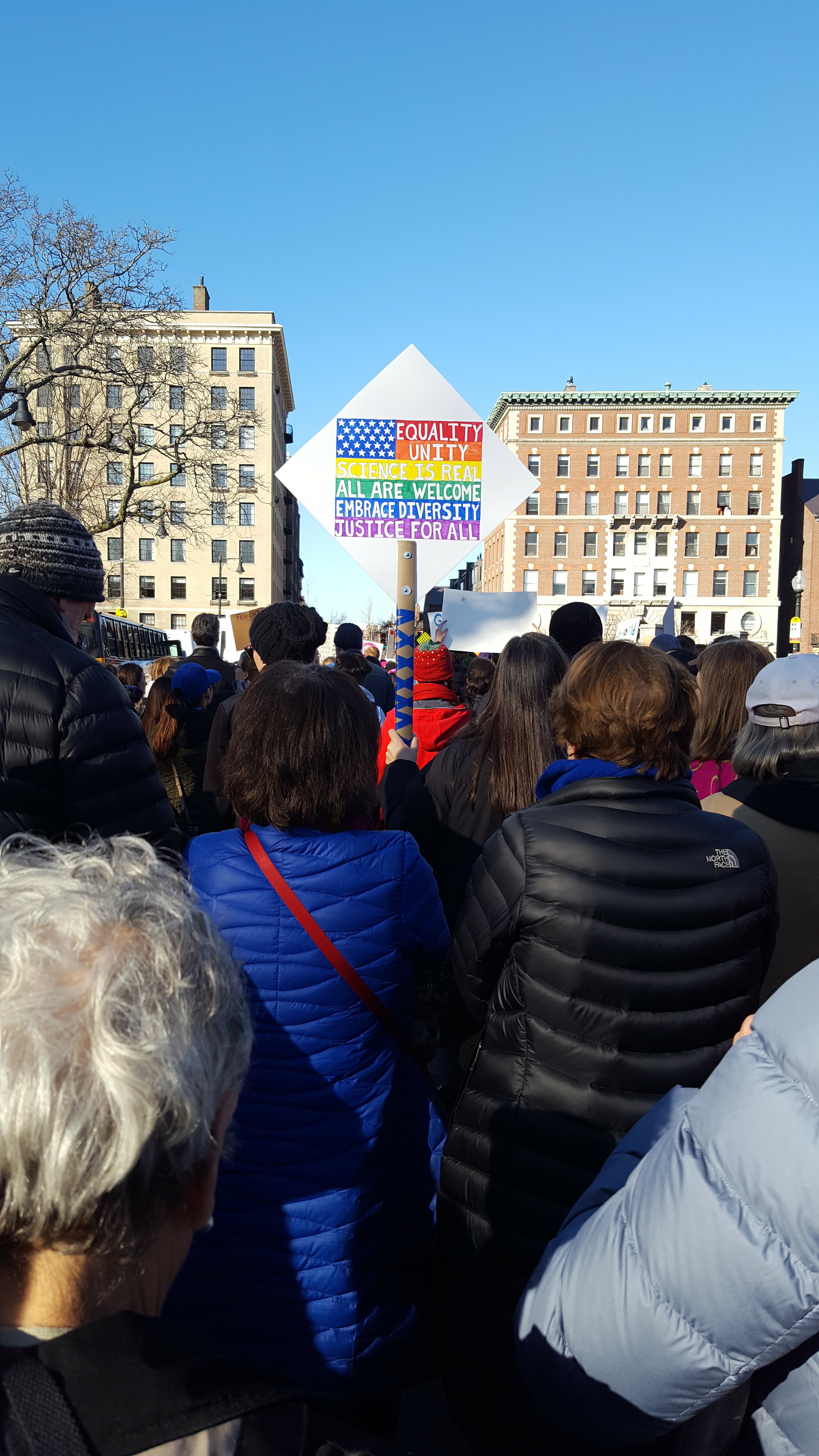On January 21, 2017, women across the world made history. Over 125,000 Bostonians and New Englanders gathered in the Boston Common to march in solidarity with communities affected most by intolerance, hate and injustice. Symbolically, the event took place the day after Donald Trump was inaugurated as the 45th President of the United States.
“United by more than 600 sister marches happening throughout the world, we sent a clear message to elected leaders that we are a country that stands for equality, dignity and justice,” the Boston Women’s March for America organizers stated publically after the event. “We thank the City of Boston, all public safety officials, and our thousands of marchers for a peaceful, positive event.”
Zero police incidents were reported at the marches in Boston and Washington, D.C., where the crowd was roughly three times the size of the audience at President Trump’s inauguration. The Washington, D.C., event inspired Boston’s march and many others around the country and the world, all held on the same day. Demonstrators stood with communities of women, immigrants, people of color, people who identify as LGBTQIA, and people with disabilities, to peacefully demand religious freedom, human rights, climate justice, racial justice, economic justice, and reproductive justice.
 “We’re here today because of the power of women …the power of women to make sure that as our country enters a new political era that the voices of the people will be heard,” said Senator Elizabeth Warren in her remarks at the event.
“We’re here today because of the power of women …the power of women to make sure that as our country enters a new political era that the voices of the people will be heard,” said Senator Elizabeth Warren in her remarks at the event.
“The fact is that the playing field has been tilted badly, in favor of those at the top for a generation now,” said Senator Warren. “And now President Trump and the republican congress are ready to ram through laws that will tilt it even further. Now we can whimper, we can whine, or we can fight back and me I’m here to fight back!”
In addition to Senator Warren, attendees heard from Attorney General Healey, Mayor Marty Walsh and other local advocates and organizers.
Days before the march, Boston organizer Yordanos Eyoel expressed that she was most excited to see faces of diverse women, men and youth. “I have been incredibly inspired and privileged to be apart of such an incredible group of people committed to making this country better, supporting one another, standing for unity, democracy and freedom for everyone,” she said.
Eyoel was born in Ethiopia, and moved to the United States when she was 13-years-old. She became a U.S. citizen this past September and voted in her first presidential election on November 8. “It’s my responsibility as a new citizen to be active, and make sure other people have the space to do that,” she said.
Despite the packed crowd in the Boston Common, marchers expressed support and patience for one another throughout the event. Crowds proceeded on a one mile route down Commonwealth Avenue, to Clarendon Street and back to the Common, turning Boston into a sea of pink hats and filling the air with chants and homemade signs.
“While I think that President Trump poses a major threat to security and basic human rights, I have faith that our democracy will keep him in check. Using our right to peacefully protest is going to serve as one of those checks, and I hope that today was only a warm up,” said marcher Casey Campbell. She is a recent graduate from Emerson College in Boston and attended the march with her 15-year-old sister.
“[My sister] wants to be a surgeon, a field that, like many, remains male dominated,” said Campbell. “I hope that today showed her that thousands of other women are rooting for her to break glass ceilings–something that I hope to do in my own career as well.”
Candace Mullane, who was born in Massachusetts and graduated from Simmons College in 2015, described her time at the march as one of the most powerful experiences of her life.
“To step on the Boston Common and see almost 200,000 people around me coming together to fight against this hateful rise to power and to fight for love, social progress and to support each other brought me to my knees in tears,” said Mullane. “I felt that we could create real resistance and change. I’ve gone to many events throughout the past five years for various social justice causes and the turnout has consistently been pretty small… to see thousands of people show up to fight for a just government and human rights was unbelievable for me.”
To keep progress in motion, organizers in Washington launched a new campaign, “10 Actions for the First 100 Days,” the day after the events. Participants can sign up to receive a new action every 10 days to remain politically engaged and continue fighting for the issues and values highlighted during the historic day of marching.

Leave a Reply
You must be logged in to post a comment.